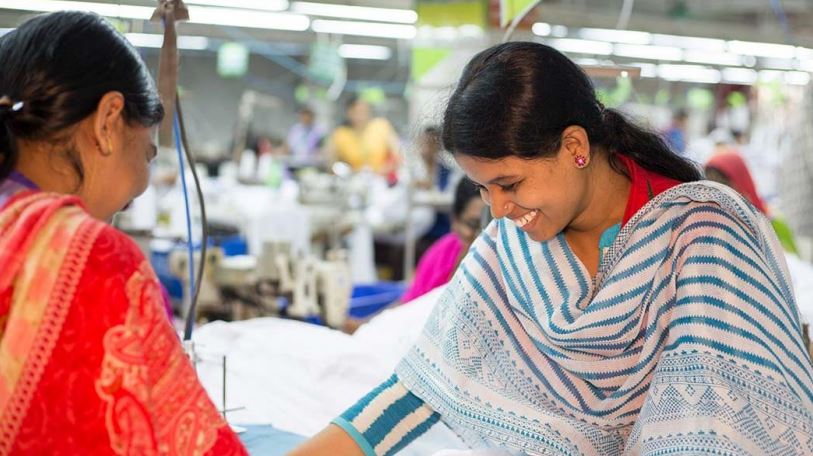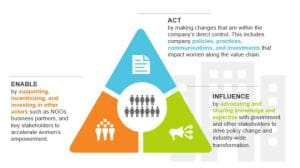
Threads Along the Value Chain
12 June 2017
Media Contact
Around the world, most people earn an income by selling their labor. But not all who do so have the same rights and entitlements to contracts, minimum wages, pensions and even protections that guarantee their health and safety. Many of those who work, do so in informal labor markets generating an income by selling produce or selling their labor to a firm or another business. Those who work informally have no income security, are seldom unionized and are rarely afforded statutory labor market protections.
Many international buyers are increasingly concerned about informality in their supply chains, especially as informality and poor conditions of work affect their reputation and undermine productivity within the value chain. The garment industry is no exception. A number of prominent brands have been looking for ways to improve the conditions of work in the global garment value chain and to ensure that workers in factories they buy from have decent and formal work agreements. To do so, some of these brands have introduced initiatives to support and empower the largely female workforce and to improve the terms and conditions of their employment. These initiatives equip workers with skills and knowledge about their rights and create incentives for employers to invest in their workers. This is done with the intention of improving outcomes for workers and for the firms that employ them.

One example is Gap Inc.’s Personal Advancement and Career Enhancement, or P.A.C.E., program, which teaches women the managerial, interpersonal, organizational skills needed to move forward in work and in life. For many years, ICRW worked closely with Gap Inc.’s P.A.C.E. Program, conducting multi-country evaluations which demonstrated that the P.A.C.E. program offers an effective, sustainable and scalable model that yields returns for women, their families and the businesses where they work. Another initiative is Business for Social Responsibility’s HERproject, which provides resources and training to women workers in garment value chains and has been adopted and funded by a number of key brands.
Although these initiatives from multinational corporations and global coalitions have begun to galvanize industry action, there is still much progress to be made. ICRW recently conducted interviews with a variety of stakeholders including union representatives, government, civil society, producers, and cooperatives to understand the challenges women in the workface face and potential areas for improvement of apparel sector supply chains. Based on ICRW’s research, a new BSR report highlights three critical areas for global apparel sector investment to boost the economic empowerment of women workers.
- Address informality: Many workers labor “off the books” and often are not protected by formal contracts or labor laws. In the four countries studied for this report, estimates of informality in the garment value chain range from 50 to 80 percent. Informal workers, of which the vast majority are women, have little ability to negotiate wages, prices and payment schedules and frequently work long hours for low pay. Change must come throughout the entire value chain, as informality increases further down the value chain and is higher in subcontracting arrangements, smaller production units and home-based workshops. Initiatives to improve supply chain transparency and traceability, foster worker voice and agency, and support inspections and compliance with labor law that aim to improve the terms and conditions of subcontracted and home-based workers and microentrepreneurs, are the first step to implementing policies that promote formality in the workplace.
- Go further to end violence: Gender-based violence (GBV) is a pervasive reality for women around the world. Although most people think of intimate partner violence when they think about violence against women, there is widespread evidence that violence affects women on the way to work and in the workplace as well. Several brands interviewed had invested in gender awareness-raising and capacity-building programs with suppliers, managers and supervisors to address violence, workplace harassment and abuse. While these initiatives are crucial to address gender-equality in the workplace, the perpetuation of gender-based violence, and the high levels of tolerance for it in many societies, must be addressed on a larger scale to affect change more broadly. The International Labour Organization has recently been asked to add addressing workplace violence on the agenda for the International Labour Conference. This will provide employers, unions and governments an opportunity to tackle this problem.
- Join global efforts to recognize childcare needs: Apparel workers around the world are predominantly women in their reproductive years, many of whom have children. This highlights the need for affordable and quality child care for workers, yet providing childcare in the workplace may not be appropriate if there are concerns about quality, safety and compatibility with shift work. Reports on apparel production hub Bangalore, for example, consistently estimates that 95 percent of factories lack functional nurseries – leaving women to choose between either a consistent paycheck to support their family or direct childrearing responsibilities. Apparel sector companies can begin to reconcile the gap between childcare needs by working with allies such as local and municipal government, unions and NGOs to support access to high quality, family-centered childcare.
Appreciating the value working women bring to businesses and to their families and communities will encourage suppliers and brands to implement a more holistic, gender-sensitive approach to the apparel industry’s labor force practices. Continued efforts must be made to ensure improved factory standards and sustainability practices, with the specific goal of creating empowering and not exploitative workplaces.
For more information on addressing economic empowerment in the apparel industry, read the full BSR report or learn more about ICRW’s global work on women in the value chain.
